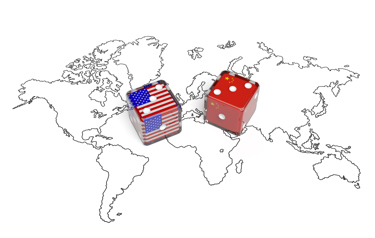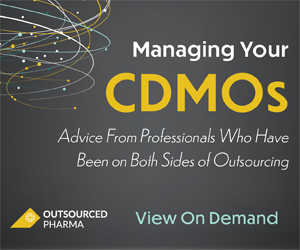Drug Tariffing: How Trade Policy And Politics Manipulate Your Outsourcing

By Louis Garguilo, Chief Editor, Outsourced Pharma

Tariffs, historic trade policy, politics: Most likely not top-of-mind at the moment.
Here’s why they should be.
Particularly for younger professionals populating U.S. biotechs – and leveraging our ecosystem of contract development and manufacturing organizations (CDMO) – there’s a vital historic political and economic trajectory you should recognize … and work to reverse.
Outsourcing Oysters
Professionals arrive on the biotech scene today intuitively understanding – or quickly grasping – the utility and value of our prodigious outsourcing infrastructure.
“For us there are these groups that are experts in Alzheimer's mouse models, or API manufacturing, or packaging and delivery, whatever we need practically,” said Justin Klee, who co-founded Cambridge, MA-based Amylyx Pharmaceuticals when he was 21 years old.
“What an opportunity for us. We get to partner with these world experts and get just the same quality as any big company. Why wouldn't we outsource?” (see: The Next Generation Appreciates Our Outsourcing Industry)
When it comes to outsourcing, the world is a young biotech professional’s oyster.
However, waves of political and economic influence have washed out to sea what could have been more opportunities to work with CDMOs closer to home.
Ebb And Flow?
Abbreviated histories come with an inherent danger of simplification. But they can also be effective in providing incentive to dive further.
Let’s start with an article penned in 2018 by Reihan Salam, President of the Manhattan Institute:
“In 2000, Congress made the fateful decision to extend ‘permanent normal trade relations,’ or PNTR, to China … With PNTR in hand, the floodgates of investment were opened, and U.S. multinationals worked hand in glove with Beijing to create new China-centric supply chains.”
Big Pharma – for various reasons – was front-and-center among those multinationals.
“To argue we ought to have normal trade relations with China was one thing …To make the case that China ought to be treated as our most favored nation was a more vexing PR challenge, not least in the wake of the brutal crackdown that followed the Tiananmen Square protests in 1989,” continued Salam.
Prior to PNTR, there was an annual debate considering many factors on whether to continue providing China what was then a lesser trade categorization (Most Favored Nation (MFN)), based on their behaviors.
People against MFN certification were, wrote Salam, “defeated by those who insisted that by opening the American economy to Chinese imports, the United States would gently nudge Beijing towards economic liberalism, multiparty democracy, and a rejection of hegemonic designs—predictions that haven’t exactly been borne out.”
Halfway through 2020, we know none of these aspirations have been sustained.
Which brings us to a point similar to Salam’s two years ago.
“I thought of the old PNTR debate in light of two recent developments,” he continued.
“One was President Donald Trump’s ongoing effort to strong-arm the Chinese government … with an eye towards reducing America’s bilateral trade deficit … I’ll simply say that if Trump’s aim has been to discredit the cause of combating Chinese mercantilism, a cause to which I am favorably disposed, he couldn’t have done a better job.”
However, added Salam, “his economic diplomacy has been greatly complicated by the legacy of PNTR.”
The second development was “the spate of recent reports on China’s intensifying repression of its Uighur minority.”
That repression intensified, and we can add actions in Hong Kong, and of course a deadly subterfuge surrounding the Wuhan coronavirus.
But PTNR ensured “non-business” judgments aren’t relevant.
To effectively reverse this stance, we need leadership from our younger generation of biotech and pharma outsourcers.
Salam: “What might the world have looked like had the U.S. never granted PNTR to China? One possibility is that China would have pursued an economic strategy built around fostering indigenous entrepreneurship and bettering the lives of its own workers, as it did in the 1980s … I suspect PNTR did exactly the opposite—creating the conditions for China’s central government to exert tighter control over the Chinese populace.
“The United States, meanwhile, would have entered the age of globalization under markedly different terms: Instead of offshoring much of its industrial base to an often-hostile authoritarian power, perhaps it would have deepened its economic ties to democratizing states in Latin America, Asia, and the wider world…”
He concluded: “We can’t rewrite history... the question is what we should do now.”
China’s own behavior (including IP theft, forced tech transfer, etc., on the business side), the Trump administration, and now the coronavirus pandemic, demand we answer that question.
Will biotech and pharma play a more positive role this time?
Who’s The Neanderthal Now?
Don Buckner is the founder and CEO of MadeInAmerica.com Inc. He knows steel like the back of his hand. He’s also become a steely-eyed leader in the fight to bring manufacturing from China back to the U.S.
“To be honest,” he says, “the most productive and effective tool has been, very simply, tariffs.”
He pauses, anticipating my reaction. I offer none, and he continues.
“Tariffs were in place for 50-plus years prior to 2000, before [President Bill] Clinton dissolved them with the PNTR to China. Those tariffs had kept level the playing field for U.S. manufacturers, who respected the environment and their workers more than you found in developing countries.”
“By reducing or eliminating those tariffs, ‘trade’ turned into ‘offshore profit zones,’ mostly untaxed, and often unreported to shareholders,” says Buckner.
The result: Millions of lost jobs in the U.S., including those in our industry.
“The phraseology I wish President Trump would use is ‘reinstate’ tariffs,” continues Buckner. “He reinstated tariffs that were in place prior to 2000.”
“These are not new; not foreign to America. President Clinton enjoyed a vibrant economy with these in place.
“Then he and Congress [Republicans controlled both the Senate and House], sad to say, sold out U.S. manufacturing.”
What it’s meant for Outsourced Pharma readers specifically is that over the years domestic options for drug development and manufacturing outsourcing were reduced.
“Christmas in 1998 really woke me up,” says Buckner.
“Very quietly, they gave China temporary most favored trade status. That was a lame duck Congress in the middle of Clinton's last term. Then in 2000, again at the end of the year, they gave China PNTR, again very quietly.
“If you were against it, you were a Neanderthal, a protectionist,” recalls Buckner. “That's how they labeled you.”
Let’s stop the labeling, and continue on what now does appear a new direction vis-à-vis our drug development and manufacturing relationship with China.
“There’s resentment towards China right now,” concludes Buckner. “Let’s leverage that in a positive way for both countries.”

